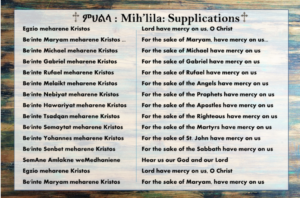The basics of Prostration According to the Eritrean Orthodox Tewahdo Church
St. Isaac said about such prostrations, “Bow at the beginning of your worship, asking God from your heart, with humiliation, to give you patience and control over your thoughts during prayers.”
Why is prostration so important, so important that it is always included with one the two main pillars of Christianity which are fasting and prayer? (fasting, prayer, and prostration) Our desert fathers and mothers have long used this act of submission as a way to weaken the flesh further especially during fasting periods, accompanied by prayer, in order to ward off the temptations that attack them in the wilderness. How much more do we need to weaken our flesh to weaken our lusts? When you are physically tired, you are less likely to engage in activities that lead you to temptation.
“I once heard demons say to each other, ‘every time we are found between monks, we see them offering metanias (prostrations) to each other, suppressing our powers’.”
Prostration is also very crucial to our life of repentance. Often, we are given a number of prostrations as a part of our penance. The act of mental submission to God, acknowledging our sin against Him, and yet again remembering His great mercies to feel the pain of our sin physically and fight off future temptations is tied in with prostration.
The Purpose of Prostration:
አክብሮ | Akbiro | Respect: The first purpose, is as a sign of respect for others (ie. elders, parents, strangers)
“So Moses went out to meet his father-in-law, bowed down, and kissed him. And they asked each other about their well-being, and they went into the tent.” [Exodus 18:7]
ጸጋ | Tsega | Grace: The second purpose is to honor the God given grace bestowed upon the Saints (ie. St. Mary, Angels, etc.)
“Now when Abigail saw David, she dismounted quickly from the donkey, fell on her face before David, and bowed down to the ground.” [1 Samuel 25:23]
አምልኮ | Amliko | Worship: Whilst the third purpose is to worship the Lord our God. This may be in the form of repentance or gratitude and praise. "But as for me, by Your abundant lovingkindness I will enter Your house, At Your holy temple I will bow in reverence for You." [Psalm 5:7]
3 Main Types of Prostration in our Church:
አድንኖ | adnino | Bowing: bending down without touching the ground.
አስተብርኮ | astebirko | Kneeling: bending down until your knees touch the ground.
ሰጊድ | segīd | Submitting: bending down fully with your head touching the ground.
It is important to understand that bowing, kneeling down, or fully submitting is not always an act of worship and that there are other purposes for prostrations. As we participate in this act, we must consider our motivations for doing so. It is quite obvious that when one sees their grandparents they do not kneel in front of them as an act of worship or honoring their grace but rather as a sign of respect. All these though, are laced in the love and humility---the love that we have for our Lord, our companions, and the Saints that pray for us and the recognition that we are sinful and weak!
Days in which prostration in full submission (Sigdet) is not conducted:
በዓለ ወልድ | be’Ale Weld | Commemoration of the Son
በዓለ ማርያም | be’Ale Maryam | Commemoration of St. Mary
ቅዱስ ሚካኤል | Qidus Mikael | Commemoration of St. Michael
ቀዳሚተ ሰንበት | Qedamite Senbet | Saturday or the First Sabbath
ሰንበተ ክርስቲያን | Senbete Kristian | Sunday or the Sabbath of Christians
After receiving Eucharist.
During the Holy 50 (unless instructed otherwise by your Father of Confession)
These restrictions consider one monthly commemoration of the Lord, St. Mary, and the Angels. This is observed throughout the calendar with the exception of Passion Week or Semune Himamat, in which the passions of Our Lord and Savior Jesus Christ are to be remembered above all.
What we say during prostrations:
The time of prostration is a crucial time for petitioning and humbling oneself. In this time the Church encourages us to ask for salvation for the sake of the pure in humility. We may also express our gratitude and spiritual needs during prostrations, as well, saying...
“Thank You my Lord Jesus Christ, for You…”,
“Grant me, O Lord, the life of purity”,
“Grant me, O Lord, the life of patience and tolerance”,
“Grant me, O Lord, the life of complete love”, or focusing on any of the other virtues.
In what manner should we prostrate?
St. John Cassian said about the monks in Egypt, “I saw them in prayer. When they have finished reciting the Psalms they do not prostrate themselves in a hurry, as if it is a duty they want to get out of the way, like many of us do. On the contrary, they stand for a while to raise a short prayer, then they prostrate themselves in awe and great devotion. After that, they get to their feet in a brisk manner, standing uprightly with all their thoughts absorbed in prayer.”
Glory be to God!

